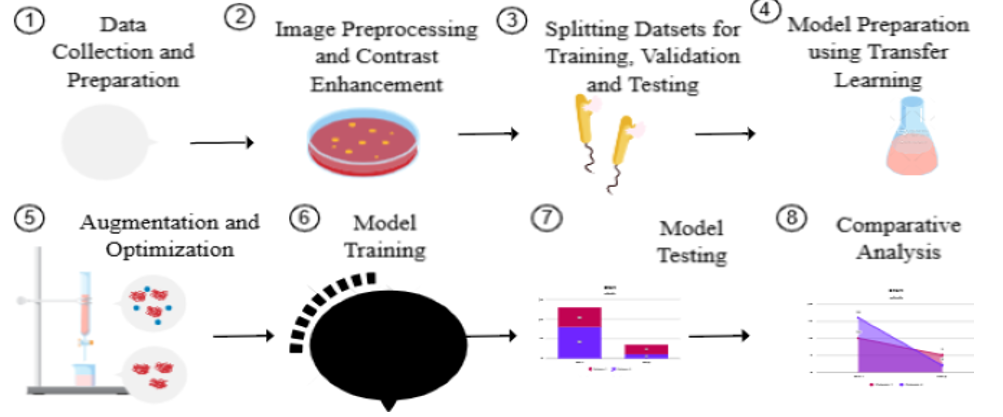An intelligent deep transfer learning platform for accurate classification of multiclass brain tumor

DOI:
https://doi.org/10.62110/sciencein.jist.2025.v13.1142Keywords:
Brain tumor, Machine learning, Deep Learning, Transfer Learning, Data Augmentation, DenseNet201, Brain MRI imagesAbstract
Cancer is the second most common cause of death worldwide after heart disease. If a tumor and its types are identified correctly in the initial phase, it can be treated immediately, and the person's life can be saved. Keeping this in mind, designing and implementing advanced, optimized deep learning models for accurate detection and classification of brain tumors ensures high precision and reliability in diagnostic outcomes and accurate identification of three classes of brain tumors. A transfer learning mechanism based on human brain MR sample datasets for the severe and efficacious classification of human brain tumors is developed here. The dataset contains samples of four classes of brain MR contrast-enhanced T1-weighted images- glioma tumors, meningioma tumors, pituitary tumors, and no tumors. We enhance the quality and diversity of the brain tumor image dataset through advanced data augmentation techniques and preprocessing methods, ensuring robustness to noise and variability in the input data. After various image preprocessing techniques are applied to enhance the quality and contrast, data augmentation is also used to increase the quantity. We used leverage transfer learning-based feature extraction methods for capturing high-level and relevant features from brain tumor images, enabling efficient representation and improved learning. The model is well trained on 4569 MR images, and its performance is tested on various performance parameters. The proposed model achieved 99.93% accuracy, 99.93% F1–score, 99.93% recall, 99.93% sensitivity, 99.93% average sensitivity, and 99.93% average specificity during training for 100 epochs. It achieved 98.1% accuracy, 98.9% F1 score, 98.3% recall, 98.05% precision, 98.9% sensitivity (average), and 99.4% specificity (average) during testing.
Downloads
Downloads
Published
Issue
Section
URN
License
Copyright (c) 2025 Neelam Khemariya, Sumit Singh Sonker

This work is licensed under a Creative Commons Attribution-NonCommercial-NoDerivatives 4.0 International License.
Rights and Permission







